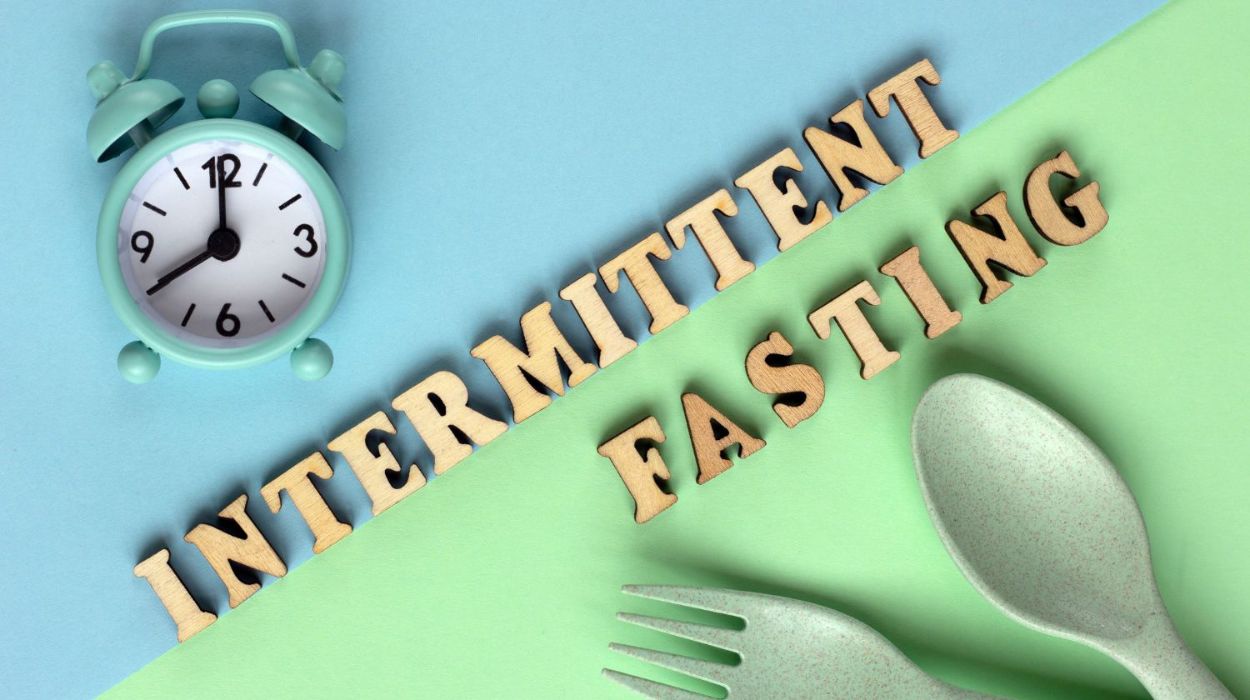 Expert's opinion
Expert's opinion
Expert's opinion
The article is a subjective view on this topic written by writers specializing in medical writing.
It may reflect on a personal journey surrounding struggles with an illness or medical condition, involve product comparisons, diet considerations, or other health-related opinions.
Although the view is entirely that of the writer, it is based on academic experiences and scientific research they have conducted; it is fact-checked by a team of degreed medical experts, and validated by sources attached to the article.
The numbers in parenthesis (1,2,3) will take you to clickable links to related scientific papers.
Health Benefits Of 12-Hour Intermittent Fasting: Risks & What To Eat?

Intermittent fasting has gained widespread attention in the recent past due to its numerous health benefits. One of the popular types of intermittent fasting is the 12-hour fast, which involves extending overnight fasting for 12 hours or more per day.
In this article, we will examine the health benefits of 12-hour intermittent fasting, how to do it, and its risks. We will also explore what foods to eat while fasting, and how long it takes to see weight loss.
7 Benefits Of The 12-Hour Intermittent Fasting
- Improved Weight Management
- Improved Metabolic Health
- Improved Gut Health
- Anti-Aging Effects
- Reduced Inflammation and Oxidative Stress
- Improved Mental Health
- Lowering Blood Sugar Levels
12/12 Vs 16/8 Intermittent Fasting
- Intermittent fasting protocols can take different forms, including alternate-day fasting, whole-day fasting, and time-restricted feeding. A review of studies conducted on intermittent fasting programs concluded that alternate-day fasting trials of three to twelve weeks appear to be consistently effective at reducing body weight, body fat, total cholesterol, and triglycerides[1].
- Time-restricted feeding, on the other hand, is a form of intermittent fasting where participants shorten the daily window in which they eat. A study that examined the effects of intermittent fasting on changes in the gut microbiome reported that time-restricted feeding did not significantly alter the diversity or overall composition of the gut microbiome[2].
What Is A 12-Hour Fast?
12-hour intermittent fasting is quite a simple concept, involving fasting for 12 hours and consuming foods for the other 12 hours of the day.
This method has proved very effective in promoting weight loss, reducing intermittent fasting and keto diet resistance, and improving overall physical and mental health. It is a form of daily intermittent fasting that is easy to follow, flexible, and customizable, meaning that it can be incorporated into anyone’s lifestyle with relative ease[3].
How Does The 12-Hour Intermittent Fasting Work?

The simple idea behind intermittent fasting is that when your body is in a fasted state, several hormonal changes take place that promote fat burning and tissue repair.
During the fasting phase, the body undergoes several changes that can help reduce insulin resistance[4], increase growth hormone secretion, and influence gene expression.
Intermittent fasting can also encourage the body to go into a process called ketosis, which supports the breakdown of fats from stored fat reserves for energy. This process has been made well known by what is called the Keto Diet.
While it is not necessary to follow intermittent fasting and keto together, combining the two can enhance the fat-burning benefits of intermittent fasting. However, combining them may lead to adverse effects such as low energy levels and a potentially slower metabolism[5].
7 Benefits Of The 12-Hour Intermittent Fasting

The following are some of the key benefits of intermittent fasting:
Improved Weight Management
Research has shown that intermittent fasting can help with weight loss, fat loss, and assist with maintaining healthy body weight. Several studies have reported that intermittent fasting is equally or more effective in promoting weight loss than other calorie-restricted diets.
Extend lifespan and protect against age-related diseases.
Improved Metabolic Health
Intermittent fasting has been found to improve several markers of metabolic health, including insulin sensitivity, blood sugar control, and cholesterol levels.
Improved Gut Health
Recent studies[6] have highlighted how intermittent fasting can positively affect the gut microbiota, which plays a crucial role in overall health and disease prevention[7].
Anti-Aging Effects
Regular fasting has been shown to lengthen life expectancy and protect against age-related diseases[8].
Reduced Inflammation And Oxidative Stress
Chronic inflammation and oxidative stress can lead to numerous diseases, including heart diseases, cancer, and Alzheimer’s disease. Intermittent fasting has been shown to reduce inflammation and oxidative stress[9], thus reducing the risks of such diseases.
Improved Mental Health
Intermittent fasting has been linked to improved mental health and brain health in various studies. According to research[10], intermittent fasting can increase brain-derived neurotrophic factor (BDNF), which leads to the resistance of neurons in the brain against dysfunction. In a study[11] conducted on rats with Alzheimer’s disease and menopause, intermittent fasting was found to protect against cognitive deterioration and metabolic disturbances while improving glucose tolerance and preventing memory loss. Intermittent fasting may also have positive effects on hormonal circadian rhythms[12]. Though more robust research is necessary, the current studies indicate that intermittent fasting can lead to cognitive and metabolic improvements, potentially leading to increased life and health span.
Lowering Of Blood Sugar Levels
Intermittent fasting has been shown to reduce blood sugar levels[13], which may help prevent type 2 diabetes. A study[14] on rats showed that intermittent fasting improved glucose and insulin sensitivity.
Risks Of The 12-Hour Intermittent Fasting
In general, a 12 hour eating pattern is considered to be safe for most healthy adults, and the potential risks are relatively minor[15]. It is possible that the fasting window could lead to overeating during the feeding window if calorie restriction is too high, especially if the person is not consuming nutrient-dense foods.
Restricting calories during your eating window is also something to monitor. Burning fat, losing weight, and improved insulin sensitivity can be goals, but it’s important to use intermittent fasting in a closely monitored and healthy way.
There are concerns that individuals who have chronic liver diseases may be more susceptible to adverse events when observing fasting. The body may enter starvation mode too soon if nutrient deficient foods are consumed, and this can lead to fatigue, lightheadedness, and other adverse reactions and often leads to the question, does intermittent fasting slow metabolism?
If the individual follows a well-balanced diet, drinks enough fluids, and listens to their body’s signals, these risks can be adequately managed[16].
How To Do The 12-Hour Intermittent Fasting?
For 12-hour intermittent fasting, designate a 12-hour window in which you eat a healthy diet and a 12-hour window in which no food will be consumed.
For example, make your evening meal at 7 PM and eat breakfast at 7 AM the following day. It could also be practical to skip breakfast and eat only between 12:00 PM to 8:00 PM to achieve the same 12 hour fast.
Repeat this schedule in 12-hour intervals so your body can gradually get used to the routine[17]. However, keep in mind that prolonged fasting without any medical guidance and supervision could also lead to adverse effects[18], and fasting periods should be discussed with healthcare advisors especially if you have a history of eating disorders.
It is important to take note of your daily caloric intake to avoid vitamin deficiencies, nutrient deficiencies, decreased muscle mass, and hunger pains from an excessive calorie deficit.
During your fasting window, you can drink black coffee and calorie free drinks such as water or sparkling water.
Non fasting days can also be added in occasionally to give yourself some variety.
What To Eat While 12-Hour Intermittent Fasting?

It is important to focus on nutrient-dense foods that provide the necessary nutrients when breaking a fast. During the feeding window, it is best to consume balanced meals that include healthy fats, protein, and complex carbohydrates from fresh fruits, vegetables, and whole grains. Nutrient-dense oils such as MCT oil can also be used during intermittent fasting to provide an energy boost without consuming extra calories and to enhance weight loss efforts[19].
Foods to eat while fasting should be low in calories and easy to digest. Drinking water, coffee, and tea during the fast can help reduce hunger and thirst[20]. Consuming MCT oil, which is readily metabolized in the liver, can help extend the fast by increasing ketone production[21].
It is important to do your research to find the best mct oils. When breaking the fast, it is recommended to start with small and easily digestible meals and gradually increase the serving size as the body adapts to the feeding period.
How Long Does It Take To See Weight Loss?
The time it takes to see significant intermittent fasting weight loss results varies from person to person.
However, studies[22] have shown that participants who engaged in intermittent fasting experienced weight loss in as little as four to six weeks. Consistency with the fasting period and eating healthy foods while on the feeding period can lead to better and sustained results.
The rate at which an individual loses weight on intermittent fasting will depend on factors such as starting weight and body composition, diet, and exercise levels. However, research[23] has suggested that intermittent fasting can result in weight loss of up to 10% of total body weight within 3-6 months.
Conclusion
Intermittent fasting is a popular way of improving overall health and reducing the risk of chronic diseases. The 12-hour intermittent fast offers an easy-to-follow regimen with numerous health benefits, including weight loss, improved metabolic health, and lower inflammation.
It is essential to listen to the body and discontinue fasting if adverse effects are observed, and to consult a doctor before starting the fast, especially if one has a medical condition. Combining intermittent fasting and a healthy lifestyle can lead to sustainable weight loss and overall good health.
Frequently Asked Questions
12-hour intermittent fasting involves fasting for 12 hours and consuming food for the remaining 12 hours. It promotes weight loss, reduces insulin resistance, improves overall physical and mental health, and positively affects the gut microbiota.
Studies have shown that alternate-day fasting trials appear to be consistently effective at reducing body weight, body fat, total cholesterol, and triglycerides, while time-restricted feeding did not significantly alter the diversity or overall composition of the gut microbiome.
Intermittent fasting has been found to improve weight management, metabolic health, gut health, has anti-aging effects, and reduces inflammation and oxidative stress.
While the risks are generally minor, concerns exist over overeating during the feeding window, eating nutrient-deficient foods, entering starvation mode too soon, and hepatic complications among individuals with pre-existing liver diseases.
Nutrient-dense foods like healthy fats, protein, and complex carbohydrates from fresh fruits, vegetables, and whole grains are recommended. MCT oil is an option that provides energy without extra calories and enhances weight loss efforts.
It varies from person to person, but studies have shown that participants can experience weight loss in as little as four to six weeks. Consistency with the fasting period and healthy eating during the feeding period leads to better and sustained results.
When the body is in a fasted state, hormonal changes take place that promote fat burning and tissue repair, reduce insulin resistance, reduce inflammation, increase growth hormone secretion, influence gene expression, and encourage the body to go into ketosis, supporting the breakdown of fats for energy.
Future studies should examine the effects of intermittent fasting on body composition and clinical health markers in humans and the potential synergistic effects of combining intermittent fasting with physical activity. Combining intermittent fasting with a healthy lifestyle leads to sustainable weight loss and overall good health.
+ 23 sources
Health Canal avoids using tertiary references. We have strict sourcing guidelines and rely on peer-reviewed studies, academic researches from medical associations and institutions. To ensure the accuracy of articles in Health Canal, you can read more about the editorial process here
- Tinsley, G.M. and Paul La Bounty (2015). Effects of intermittent fasting on body composition and clinical health markers in humans. [online] 73(10), pp.661–674. doi:https://doi.org/10.1093/nutrit/nuv041.
- Gabel, K. (2020). Effect of time restricted feeding on the gut microbiome in adults with obesity: A pilot study – Kelsey Gabel, Jarrad Marcell, Kate Cares, Faiza Kalam, Sofia Cienfuegos, Mark Ezpeleta, Krista A. Varady, 2020. [online] Nutrition and Health. Available at: https://journals.sagepub.com/doi/10.1177/0260106020910907.
- Tinsley, G.M. and Paul La Bounty (2015). Effects of intermittent fasting on body composition and clinical health markers in humans. [online] 73(10), pp.661–674. doi:https://doi.org/10.1093/nutrit/nuv041.
- Rümeysa GERBOĞA and Cansu BEKAR (2023). Effects of Intermittent Fasting on Weight Loss and Cardiometabolic Health. [online] doi:https://doi.org/10.58208/cphs.1218650.
- Annual Reviews. (2017). Metabolic Effects of Intermittent Fasting. [online] Available at: https://www.annualreviews.org/doi/10.1146/annurev-nutr-071816-064634.
- Li, L., Su, Y., Li, F., Wang, Y., Ma, Z., Li, Z. and Su, J. (2020). The effects of daily fasting hours on shaping gut microbiota in mice. [online] 20(1). doi:https://doi.org/10.1186/s12866-020-01754-2.
- Gabel, K. (2020). Effect of time restricted feeding on the gut microbiome in adults with obesity: A pilot study – Kelsey Gabel, Jarrad Marcell, Kate Cares, Faiza Kalam, Sofia Cienfuegos, Mark Ezpeleta, Krista A. Varady, 2020. [online] Nutrition and Health. Available at: https://journals.sagepub.com/doi/10.1177/0260106020910907.
- Tinsley, G.M. and Paul La Bounty (2015). Effects of intermittent fasting on body composition and clinical health markers in humans. [online] 73(10), pp.661–674. doi:https://doi.org/10.1093/nutrit/nuv041.
- Mindikoglu, A.L., Abdulsada, M.M., Jain, A., Jalal, P.K., Sridevi Devaraj, Wilhelm, Z.R., Opekun, A.R. and Jung, S.-A. (2020). Intermittent fasting from dawn to sunset for four consecutive weeks induces anticancer serum proteome response and improves metabolic syndrome. [online] 10(1). doi:https://doi.org/10.1038/s41598-020-73767-w.
- R. Michael Anson, Guo, Z., Rafael de Cabo, Titilola Iyun, Rios, M., Hagepanos, A., Ingram, D.K., Lane, M.A. and Mattson, M.P. (2003). Intermittent fasting dissociates beneficial effects of dietary restriction on glucose metabolism and neuronal resistance to injury from calorie intake. [online] 100(10), pp.6216–6220. doi:https://doi.org/10.1073/pnas.1035720100.
- Suna, S. (2018). Intermittent fasting protects against the deterioration of cognitive function, energy metabolism and dyslipidemia in Alzheimer’s disease-induced estrogen deficient rats – Bae Kun Shin, Suna Kang, Da Sol Kim, Sunmin Park, 2018. [online] Experimental Biology and Medicine. Available at: https://journals.sagepub.com/doi/10.1177/1535370217751610.
- Kim, B.-H., Joo, Y., Eun Kyung Kim, Choe, H., Tong, Q. and Kwon, O. (2021). Effects of Intermittent Fasting on the Circulating Levels and Circadian Rhythms of Hormones. [online] 36(4), pp.745–756. doi:https://doi.org/10.3803/enm.2021.405.
- Annual Reviews. (2017). Metabolic Effects of Intermittent Fasting. [online] Available at: https://www.annualreviews.org/doi/10.1146/annurev-nutr-071816-064634.
- Fehime Benli Aksungar, Eren, A., Ure, S., Onder Teskin and Ates, G. (2005). Effects of Intermittent Fasting on Serum Lipid Levels, Coagulation Status and Plasma Homocysteine Levels. [online] 49(2), pp.77–82. doi:https://doi.org/10.1159/000084739.
- Emara, M.H., Abelaty, A.I., Elbatae, H.E., Osama Mostafa Abdelrazik and Elgammal, N.E. (2023). The need for a risk-assessment tool among patients with chronic liver diseases interested in intermittent fasting: Ramadan model. [online] doi:https://doi.org/10.1093/nutrit/nuad046.
- Emara, M.H., Abelaty, A.I., Elbatae, H.E., Osama Mostafa Abdelrazik and Elgammal, N.E. (2023). The need for a risk-assessment tool among patients with chronic liver diseases interested in intermittent fasting: Ramadan model. [online] doi:https://doi.org/10.1093/nutrit/nuad046.
- 채수인, 남상남 and 김인동 (2015). Effect of Nutrition and Exercise Modification Therapy on Metabolism Efficiency of Middle-aged Women Through Convergence. [online] doi:https://doi.org/10.14400/jdc.2015.13.5.393.
- Moser, O., Eckstein, M.L., Mueller, A., Tripolt, N.J., Yildirim, H., Abbas, F., Pferschy, P.N., Goswami, N., Aberer, F., Obermayer, A., Pieber, T.R., Harald Kojzar, Sourij, C., Brunner, M., Niedrist, T., Herrmann, M. and Harald Sourij (2021). Impact of a Single 36 Hours Prolonged Fasting Period in Adults With Type 1 Diabetes – A Cross-Over Controlled Trial. [online] 12. doi:https://doi.org/10.3389/fendo.2021.656346.
- Horne, B.D., Meir Grajower and Anderson, J.L. (2020). Limited Evidence for the Health Effects and Safety of Intermittent Fasting Among Patients With Type 2 Diabetes. [online] 324(4), pp.341–341. doi:https://doi.org/10.1001/jama.2020.3908.
- Rümeysa GERBOĞA and Cansu BEKAR (2023). Effects of Intermittent Fasting on Weight Loss and Cardiometabolic Health. [online] doi:https://doi.org/10.58208/cphs.1218650.
- Annual Reviews. (2017). Metabolic Effects of Intermittent Fasting. [online] Available at: https://www.annualreviews.org/doi/10.1146/annurev-nutr-071816-064634.
- Tinsley, G.M. and Paul La Bounty (2015). Effects of intermittent fasting on body composition and clinical health markers in humans. [online] 73(10), pp.661–674. doi:https://doi.org/10.1093/nutrit/nuv041.
- Tinsley, G.M. and Paul La Bounty (2015). Effects of intermittent fasting on body composition and clinical health markers in humans. [online] 73(10), pp.661–674. doi:https://doi.org/10.1093/nutrit/nuv041.



